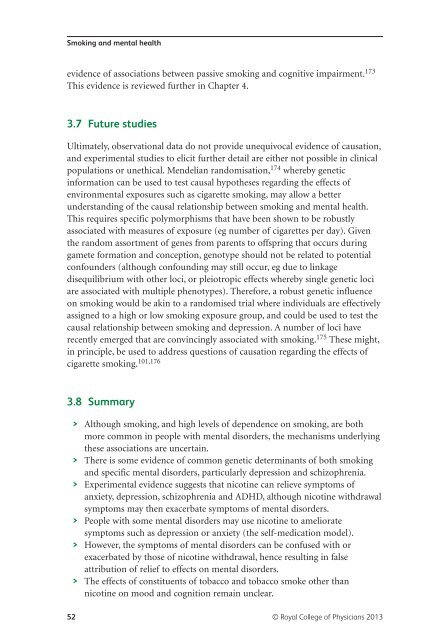Smoking and mental health - NCSCT
Smoking and mental health - NCSCT
Smoking and mental health - NCSCT
You also want an ePaper? Increase the reach of your titles
YUMPU automatically turns print PDFs into web optimized ePapers that Google loves.
<strong>Smoking</strong> <strong>and</strong> <strong>mental</strong> <strong>health</strong><br />
evidence of associations between passive smoking <strong>and</strong> cognitive impairment. 173<br />
This evidence is reviewed further in Chapter 4.<br />
3.7 Future studies<br />
Ultimately, observational data do not provide unequivocal evidence of causation,<br />
<strong>and</strong> experi<strong>mental</strong> studies to elicit further detail are either not possible in clinical<br />
populations or unethical. Mendelian r<strong>and</strong>omisation, 174 whereby genetic<br />
information can be used to test causal hypotheses regarding the effects of<br />
environ<strong>mental</strong> exposures such as cigarette smoking, may allow a better<br />
underst<strong>and</strong>ing of the causal relationship between smoking <strong>and</strong> <strong>mental</strong> <strong>health</strong>.<br />
This requires specific polymorphisms that have been shown to be robustly<br />
associated with measures of exposure (eg number of cigarettes per day). Given<br />
the r<strong>and</strong>om assortment of genes from parents to offspring that occurs during<br />
gamete formation <strong>and</strong> conception, genotype should not be related to potential<br />
confounders (although confounding may still occur, eg due to linkage<br />
disequilibrium with other loci, or pleiotropic effects whereby single genetic loci<br />
are associated with multiple phenotypes). Therefore, a robust genetic influence<br />
on smoking would be akin to a r<strong>and</strong>omised trial where individuals are effectively<br />
assigned to a high or low smoking exposure group, <strong>and</strong> could be used to test the<br />
causal relationship between smoking <strong>and</strong> depression. A number of loci have<br />
recently emerged that are convincingly associated with smoking. 175 These might,<br />
in principle, be used to address questions of causation regarding the effects of<br />
cigarette smoking. 101,176<br />
3.8 Summary<br />
> Although smoking, <strong>and</strong> high levels of dependence on smoking, are both<br />
more common in people with <strong>mental</strong> disorders, the mechanisms underlying<br />
these associations are uncertain.<br />
> There is some evidence of common genetic determinants of both smoking<br />
<strong>and</strong> specific <strong>mental</strong> disorders, particularly depression <strong>and</strong> schizophrenia.<br />
> Experi<strong>mental</strong> evidence suggests that nicotine can relieve symptoms of<br />
anxiety, depression, schizophrenia <strong>and</strong> ADHD, although nicotine withdrawal<br />
symptoms may then exacerbate symptoms of <strong>mental</strong> disorders.<br />
> People with some <strong>mental</strong> disorders may use nicotine to ameliorate<br />
symptoms such as depression or anxiety (the self-medication model).<br />
> However, the symptoms of <strong>mental</strong> disorders can be confused with or<br />
exacerbated by those of nicotine withdrawal, hence resulting in false<br />
attribution of relief to effects on <strong>mental</strong> disorders.<br />
> The effects of constituents of tobacco <strong>and</strong> tobacco smoke other than<br />
nicotine on mood <strong>and</strong> cognition remain unclear.<br />
52 © Royal College of Physicians 2013














